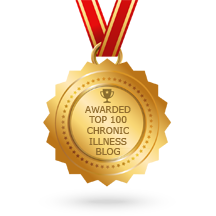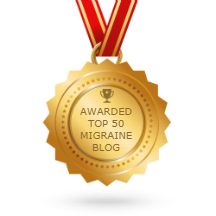Winning the Sick Game
 I'm in a period of relative stability right now, for the first time in about 5 years. I am still getting migraines, but it's easier to deal with them, and I do not get as incapacitated and debilitated as I did before. I am so thankful for that. For the first time in years, I'm planning my future, applying to jobs and internship programs without having to worry if I won't be able to follow through. It's a relief, actually, to actually be able to think like this. I didn't have this luxury for the second half of my teenage years. I mostly just tried to make it through each week.
I'm in a period of relative stability right now, for the first time in about 5 years. I am still getting migraines, but it's easier to deal with them, and I do not get as incapacitated and debilitated as I did before. I am so thankful for that. For the first time in years, I'm planning my future, applying to jobs and internship programs without having to worry if I won't be able to follow through. It's a relief, actually, to actually be able to think like this. I didn't have this luxury for the second half of my teenage years. I mostly just tried to make it through each week.
I'm still a part of many support groups online, and I write for my blog and The Mighty about my experiences with migraines. It's become helpful for me to write, because when I was really sick I basically lost my voice. I lost my ability to speak coherently, write, read, and focus. Now that I have regained my abilities to function, I am trying my best to speak about my experiences because I know how isolating and frustrating it can be to lose things that we all take for granted in life.
Nowadays, I feel a pang of guilt when I sit down to write. I feel a bit hypocritical sometimes, because I am not as sick as I used to be. I think of all the people who are currently sick, and how I am so lucky to be in the place that I am right now. I get so caught up in comparing myself to other people and their illnesses that I forget that I, too, went through hell and back. Just because I am relatively healthier now than I was then does not mean that my experiences and my feelings are invalid. We need to stop comparing our illnesses in terms of how severe that they are, because chronic illness affects everyone differently. I've had people talk to me and say "Oh, I get migraines, but not as bad as you do." Why do we feel the need to qualify our experiences and apologize just because sometimes we meet others whose conditions are more severe or better than ours? There's no prize for being the sickest, no title or headline for "winning the sick game." No good can come out of negative comparisons. We already deal with enough shame surrounding our illnesses. All of our experiences with chronic illness matter, and we need to remind ourselves of that.
I share my stories about my hospital experiences and the hundreds of med trials that I've been on not to make other people feel bad for me, but to just share my story. Not to compare, not to analyze, just to get it out there.
I share my stories about my hospital experiences and the hundreds of med trials that I've been on not to make other people feel bad for me, but to just share my story. Not to compare, not to analyze, just to get it out there.
I often have to remind myself that for me, my illness was bad. When I was at my worst, I didn't leave my house, slept for 15 hours a day, could barely leave my bed, or even walk down the stairs. I lost everything about myself that I loved. I lost my extracurriculars, my academics, and all of the hopes and dreams that I had growing up. I thought that I would never be able to do anything meaningful with my life because I could barely function. I lost my identity. My chronic illness became my identity.
I've spent the last 2 years rebuilding myself from scratch. Who I am now is completely different from who I was before I got sick. But I went through a period where I had to deal with everything that I couldn't mentally deal with when I was sick. I've experienced the helplessness, the loss of identity and control, and the medical traumas. It's a lot to deal with, for anyone. For me, writing about my experiences were a way to think through my life, a way to cope with the cards I've been dealt in life. I feel very lucky that right now my life is a bit better medically than it was for most of this year, and exponentially better than the last 5 years of my life.
I am alive. That's how I often describe how I'm doing these days. I'm alive. I'm getting through everything, one step at a time. My experiences are part of who I am, but they have also shaped me into the person that I am today. I've known what it's like to lose almost everything that's important to you. It's such a weird feeling knowing that the world is at my fingertips, for the first time in forever. There's still a part of me that's terrified that I'll lose everything again. But if I live like that, I will never be happy. I'll always be scared, terrified to dream because of how easily it may be taken away from me. One of my good friends has a saying: "if your dreams don't scare you, they aren't big enough." That dream could be mustering up the courage to talk frankly with your doctor about a treatment you've heard about, planning an outing, or for me, looking into summer public health internships. I'm just starting to realize that I can dream again. I hope that you all can too.
As always, have an amazing, migraine-free week!
I am alive. That's how I often describe how I'm doing these days. I'm alive. I'm getting through everything, one step at a time. My experiences are part of who I am, but they have also shaped me into the person that I am today. I've known what it's like to lose almost everything that's important to you. It's such a weird feeling knowing that the world is at my fingertips, for the first time in forever. There's still a part of me that's terrified that I'll lose everything again. But if I live like that, I will never be happy. I'll always be scared, terrified to dream because of how easily it may be taken away from me. One of my good friends has a saying: "if your dreams don't scare you, they aren't big enough." That dream could be mustering up the courage to talk frankly with your doctor about a treatment you've heard about, planning an outing, or for me, looking into summer public health internships. I'm just starting to realize that I can dream again. I hope that you all can too.
As always, have an amazing, migraine-free week!














0 comments: